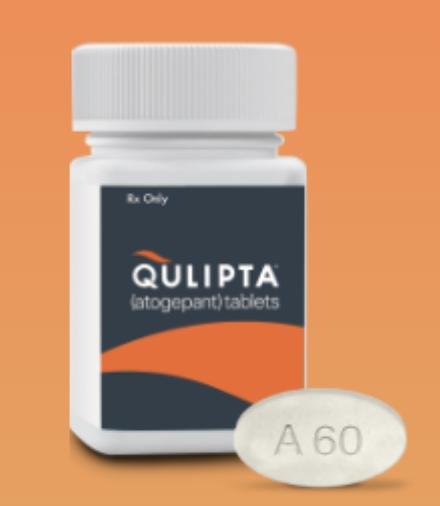Qulipta Side Effects
Generic name: atogepant
Note: This document provides detailed information about Qulipta Side Effects associated with atogepant. Some dosage forms listed on this page may not apply specifically to the brand name Qulipta.
Applies to atogepant: oral tablet.
Precautions
It is very important that your doctor check your progress at regular visits. This will allow your doctor to see if the medicine is working properly and to decide if you should continue to use it.
If your symptoms do not improve within a few days or if they become worse, check with your doctor.
This medicine may cause serious allergic reactions, including anaphylaxis, which can be life-threatening and require immediate medical attention. Check with your doctor right away if you have chest tightness, cough, difficulty swallowing, dizziness, fast heartbeat, hives, itching, skin rash, puffiness or swelling of the eyelids or around the eyes, face, lips, or tongue, trouble breathing, or unusual tiredness.
Do not take other medicines unless they have been discussed with your doctor. This includes prescription or nonprescription (over-the-counter [OTC]) medicines and herbal (eg, St. John's wort) or vitamin supplements. Tell your doctor if you drink grapefruit juice.
Common side effects of Qulipta
Some side effects of atogepant may occur that usually do not need medical attention. These side effects may go away during treatment as your body adjusts to the medicine. Also, your health care professional may be able to tell you about ways to prevent or reduce some of these side effects.
Check with your health care professional if any of the following side effects continue or are bothersome or if you have any questions about them:
More common side effects
- constipation
- nausea
- sleepiness or unusual drowsiness
- unusual tiredness or weakness
Less common side effects
- decreased appetite
- decreased weight
Incidence not known
- chest tightness
- cough
- difficulty swallowing
- dizziness
- fast heartbeat
- hives, itching, skin rash
- puffiness or swelling of the eyelids or around the eyes, face, lips, or tongue
- trouble breathing
Serious side effects of Qulipta
Along with its needed effects, atogepant (the active ingredient contained in Qulipta) may cause some unwanted effects. Although not all of these side effects may occur, if they do occur they may need medical attention.
See also:
For healthcare professionals
Applies to atogepant: oral tablet.
General adverse events
The more commonly reported adverse reactions have included nausea, constipation, and fatigue.[Ref]
Gastrointestinal
- Common (1% to 10%): Nausea, constipation
Hepatic
- Common (1% to 10%): Liver enzyme elevations[Ref]
Transaminase elevations greater than 3 times the upper limit of normal (3 x ULN) were reported similarly for patients receiving this drug and those receiving placebo (1% vs 1.8%). Temporally associated cases of transaminase elevations were reported with use of this drug; they were asymptomatic and resolved within 8 weeks of discontinuation.[Ref]
Hypersensitivity
- Postmarketing reports: Hypersensitivity reactions[Ref]
Metabolic
- Common (1% to 10%): Decreased appetite, weight loss
Weight loss of greater than 7% of body weight was reported for 3.8% of patients receiving 10 mg/day, 3.2% for 30 mg/day, and 4.9% for patients receiving 60 mg/day (compared to 2.8% for placebo).
Nervous system
- Common (1% to 10%): Somnolence, dizziness[Ref]
Other
- Common (1% to 10%): Fatigue[Ref]
References
1. (2021) "Product Information. Qulipta (atogepant)." AbbVie US LLC
2. (2023) "Product Information. Qulipta (atogepant)." AbbVie US LLC, SUPPL-4
3. Boinpally R, Jakate A, Butler M, Borbridge L< Periclou A (2021) "Single-dose pharmacokinetics and safety of atogepant in adults with hepatic impairment: results from an open-label, phase 1 trial." Clin Pharmacol Drug Dev, 10, p. 726-33
Frequently asked questions
- How do Ubrelvy, Qulipta and Nurtec compare for migraines?
- What are the newest migraine medications in 2025?
- Does Qulipta cause weight loss?
- How long does Qulipta take to work?
- When is the best time of the day to take Qulipta?
- Does Qulipta (atogepant) cause hair loss?
- How well does Qulipta work for migraine?
- How does Qulipta work?
More about Qulipta (atogepant)
- Check interactions
- Compare alternatives
- Pricing & coupons
- Reviews (190)
- Drug images
- Dosage information
- During pregnancy
- Support group
- FDA approval history
- Drug class: CGRP inhibitors
- Breastfeeding
- En español
Patient resources
Professional resources
Related treatment guides
Further information
Qulipta side effects can vary depending on the individual. Always consult your healthcare provider to ensure the information displayed on this page applies to your personal circumstances.
Note: Medication side effects may be underreported. If you are experiencing side effects that are not listed, submit a report to the FDA by following this guide.

